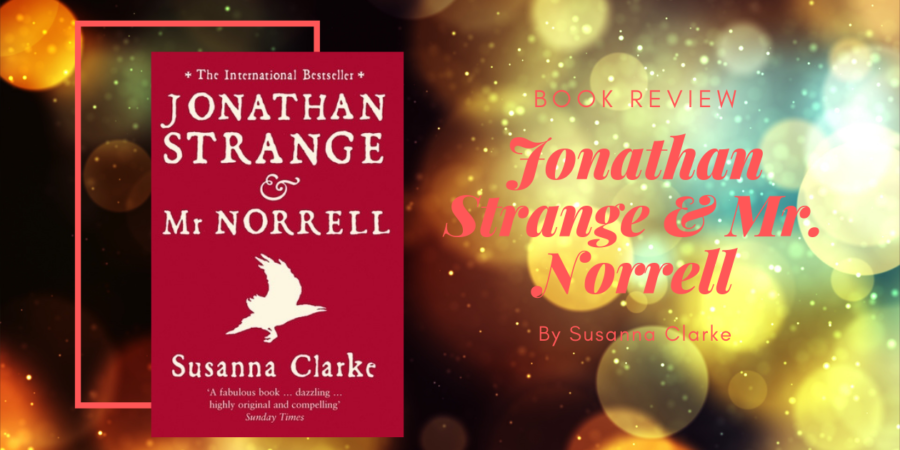I’ve been wanting to read this book for a pretty long time (Goodreads says I shelved this as ‘want to read’ in 2012!) but its size has put me off. So before I left for holiday, I decided to download this, thinking that it should last me the entire two weeks. Spoiler alert: it didn’t (I finished another three books) but I did finally finish this which is an accomplishment.
Jonathan Strange & Mr Norrell is a huge story set in alternate England where magic exists. Or used to exist, anyway. At the start of the book, all magicians are ‘theoretical magicians’, which means that they study magic instead of practice it. But when two of their number meet Mr Norrell, they convince the reclusive magician to appear in society – and so reintroduce magic to England. A few years later, Jonathan Strange appears as the second ‘practical magician’ (aka someone who actually can do magic instead of just talking about it) and becomes Mr Norrell’s apprentice. At the same time, a piece of magic woven by Mr Norrell at the start of the book brings fairies into the lives of people around him. And these fairies hate Mr Norrell.
Obviously, my summary of the book leaves out quite a bit, given that the book is one thousand pages (in some editions) and has fairies plotting, the Napoleonic war, society politics and legends of the Raven King (a mythical figure of English magic). It has a lot, but for most of the book, it doesn’t feel like nothing much happens. While I enjoyed the book and the world that Susanna Clarke created, I have to admit that the first three-quarters of the book felt like a set-up for the last quarter. Even the sections on the Napoleonic wars, though they contained fighting and armies, felt rather slow for some reason. That said, without all this detail in the first three-quarters of the book, the last quarter wouldn’t have made much sense. And it’s in the last quarter that I found myself hooked to the book and extremely eager to find out how things would end.
Character-wise, I found the supporting characters a lot more likeable than the two titular protagonists. Jonathan Strange and Mr Norrell work well as foils to each other but I didn’t find them that likeable. I much preferred to read about Lady Pole (enchanted by magic), Arabella Strange (Jonathan’s wife but has more spark than him in my opinion), and Stephen Black (also enchanted by magic). It’s probably no coincidence that these three characters were most heavily involved in the world and subplot featuring the fairies. For the first portions of the book, I found the chapters involving the Gentlemen with Thistledown Hair (the main fairy in the book) to be more interesting than Strange and Norrell’s quarrels with each other.
Although I found the sections involving the fairies to be more interesting, the non-magical part of society was also well-written. In particular, the return of magic and its effects on government was great and I can easily imagine it happening. If you’ve watched really long dramas that focus on human relations (for some reason, everything reminds me of the epic 386 episode drama, Ai) then you’d be familiar with this. If, however, you prefer action over politics and humans trying to sabotage each other (primarily Norrell’s lackeys trying to ‘protect’ Norrell by discrediting Strange), then you might find this part of the book boring.
Obviously, the type of genre you read heavily affects whether you enjoy a book or not. However, in this case, I would not recommend this to fantasy readers – not unless you’re also someone who’s into human drama and can take a long buildup. While the worldbuilding and payoff are great, there is a lot of build up/story you have to read before the plot really starts moving (in my opinion, anyway). And even though this is fantasy, it doesn’t have as many magical battles or epic displays of magic as you might expect. I sound pretty negative in the last few sentences, but I did enjoy the book (reading on holiday made me relaxed – if I read it while stressed by work, I’m not sure if I would have made it through!) and I would say that this is more for patient people who enjoy worldbuilding and character-driven novels.

I once checked this out of the library and never read it. It’s just so huge and I have so many other books checked out of the library, usually!
Hahaha yes, it is huge! I probably wouldn’t have checked it out if I didn’t have a loooong trip (13 hour flight + lots of trains) ahead of me
Nice review. This book has been sitting on the shelf for a number of years. I’ll have to tackle it one of these days. Your review helped!
I think this book is best read when you have a lot of time ahead (and want to really immerse yourself in a world)
Oh my gosh. You did ACTUALLY read it!
The fact that it sounds like SUCH a slow story makes me dread it even more … Though, the repercussions of re-discovering magic on political systems is intriguing.
Maybe I split the difference, and watch the TV series instead?
I’ve not watched the TV series but that sounds like a good idea! I enjoyed it, but I also enjoyed Anna Karenina and it’s kinda similar (in terms of heft and the fact it’s about the lives of people) but with magic